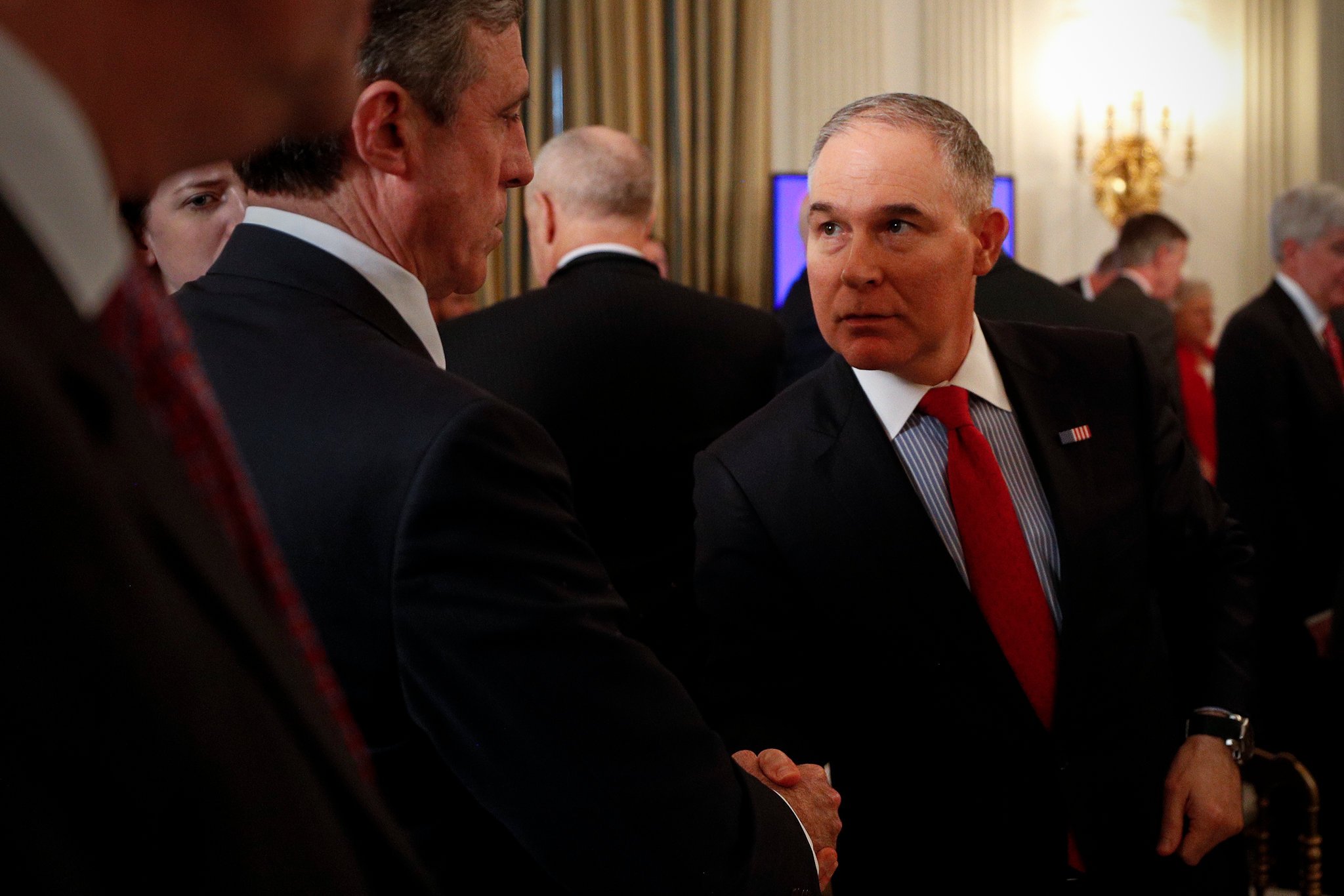
Asked about the meeting and the administration’s internal deliberations, Raj Shah, the deputy press secretary, said: “The Trump Administration will ensure that any climate science review will be conducted through a robust, interagency process, consistent with federal law.”
The E.P.A. did not respond to requests for comment.
The episode reflects some of the challenges that Mr. Kelly faces in bringing order to a chaotic White House, where policy deliberations are sometimes circumvented when people close to Mr. Trump approach him personally to seek his approval for unorthodox moves.
Mr. Kelly is a retired four-star Marine Corps general who is said to share the pragmatic view held by military leaders including Jim Mattis, the secretary of defense, that climate change is happening and poses a serious national security challenge. Since he became chief of staff last July, Mr. Kelly has toiled to control access to Mr. Trump to try to ensure that his actions are informed by an orderly process in the West Wing — a pursuit that flies in the face of the president’s freewheeling style.
The tension between the White House and the E.P.A. over the red team, blue team idea reflects a broader rift within the administration over whether and how directly to attack climate change science itself. While the words “climate change” have been removed from many federal websites, and Mr. Trump has mocked global warming in tweets, the administration has stopped short of using the power of the federal government to attack the science.

Credit
Tom Brenner/The New York Times
Holding national debates on climate change could have serious policy implications.
The fundamental science, that man-made pollution is overwhelmingly responsible for warming temperatures and rising sea levels, is widely accepted among mainstream scientists. That science formed the basis of a key 2009 E.P.A. decision known as the endangerment finding, which declares that climate change is a threat to human health and welfare. That finding is the legal backbone for almost all federal climate policy and requires the government to regulate greenhouse gas emissions in some manner. A government critique of climate science could lay the groundwork for challenging the endangerment finding in court.
Climate denialist groups like the Heartland Institute have urged Mr. Pruitt to challenge the finding, while industry associations have expressed little interest in doing so. Tim Doyle, vice president of policy for the conservative business organization American Council for Capital Formation, said the companies he works with have not expressed any interest in a public forum to challenge climate change science.
“We definitely haven’t heard any of our members supporting the red team, blue team concept,” he said. “There’s been, if anything, radio silence about it.”
The idea for red team, blue team climate debates originated with Steven Koonin, a physicist at New York University who was an energy undersecretary under Mr. Obama. Mr. Koonin in April wrote an op-ed in The Wall Street Journal calling for using the military-style exercise — in which one team attacks and another defends — to test the robustness of climate change science. One week later, he paid a visit to the E.P.A. at Mr. Pruitt’s invitation to discuss the idea further.
Mr. Koonin, in an interview, said he has “no dog in this fight” — meaning that he is willing to be persuaded that climate change is an urgent threat — but that he believes there are uncertainties in the science that are worth exploring.
Climate Change Is Complex. We’ve Got Answers to Your Questions.
We know. Global warming is daunting. So here’s a place to start: 17 often-asked questions with some straightforward answers.

In talking with federal officials, Mr. Koonin said he outlined a vision for a debate including not only the E.P.A. but also the National Aeronautics and Space Administration and the National Oceanic and Atmospheric Administration, both of which collect data and conduct studies on Arctic ice melt, global temperature modeling and other issues. The White House science adviser should coordinate any such exercise, he said, to ensure all relevant government offices participate.
“It would need to be governmentwide, certainly multiagency, in order for it to be robust and taken seriously as a scientific endeavor,” Mr. Koonin said.
Climate scientists and others who oppose the debate idea note that the studies that make up the body of knowledge on climate change already are subject to rigorous peer review. They contend that the red team, blue team exercise would be a politically motivated way to inject doubt into findings that have already been scientifically established.
“The idea of a red team approach is used to test how well forces, or strategy, will perform against an adversary. But climate science is not our adversary,” said Sherri Goodman, a former deputy undersecretary of defense under President Bill Clinton and now a senior fellow at the Woodrow Wilson International Center.
Mr. Pruitt planned to announce his red team, blue team debate in early November, according to a news release that was written but never issued. According to four people who have read the draft news release, the debates were to be organized by the E.P.A.’s science advisory board and not include other agencies.

Credit
Charles Watkins/U.S. Department of Energy
The announcement of the debates would have coincided with the release of an exhaustive scientific report from 13 United States government agencies that definitively found human activity to be responsible for almost all of the warming that has occurred in the past half-century. It would have also coincided with the start of a United Nations meeting in Germany to discuss the Paris agreement, the global climate accord from which Mr. Trump intends to withdraw the United States’ participation.
When Mr. Trump’s chief of staff learned about the news release, he demanded the debates be delayed until cabinet secretaries and top White House officials could discuss it, according to three people familiar with the discussions. That initial meeting never occurred, but on Dec. 13, the White House convened senior officials to discuss the matter.
According to two people who attended, the meeting included a presentation of the red team, blue team plan by two E.P.A. officials — Mr. Pruitt’s chief of staff and the head of the agency’s air office. Other attendees included senior officials from the Department of Energy, the White House Council on Environmental Quality, the White House Office of Science and Technology Policy, and the National Economic Council.
The meeting was run by Mr. Dearborn and Michael Catanzaro, who is a member of the economic council and the president’s domestic energy and environment policy director.
The takeaway, according to people in the room, was that every office within the White House was opposed to the idea. At one point, Mr. Dearborn said the notion of red team, blue team debates was “dead” and should not be mentioned again. “The chief doesn’t want it,” Mr. Dearborn said, referring to the White House chief of staff, according to one person who attended.
E.P.A. officials were taken aback, the person said.
In the weeks since that meeting, however, Mr. Pruitt said the red team, blue team debates were still under consideration. In January, he told Congress that a report in E & E News, a news organization focusing on energy and the environment that first reported that the White House had killed the plan, was false. White House opposition to the debates was “untrue,” he said under questioning by a senator.
For the moment, even those who have championed the red team, blue team idea like Mr. Koonin are doubtful the debates will happen. “My optimism that we can get this done in a quality way is pretty low at this point,” Mr. Koonin said. “It needs to be a governmentwide exercise and there’s nobody that I know of that has picked up the ball in the White House.”
Continue reading the main story
Powered by WPeMatico

